11+ SAMPLE Affidavit of Separation
-
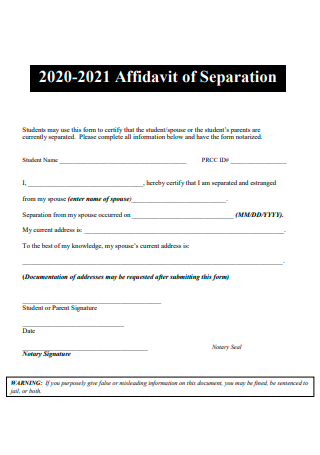
Affidavit of Separation Template
download now -
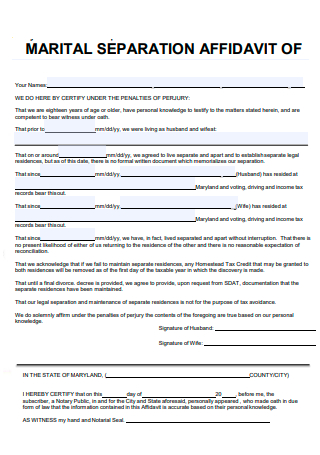
Affidavit of Martial Separation
download now -
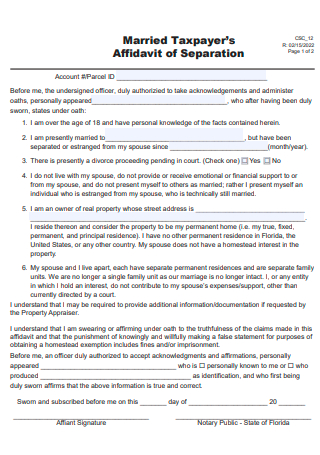
Married Tax Payers Affidavit of Separation
download now -
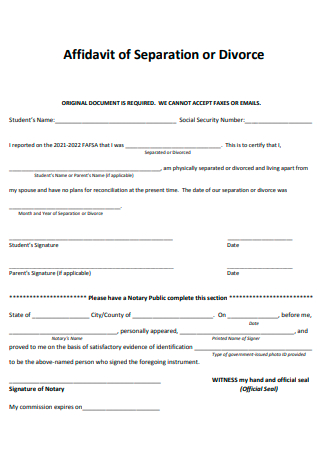
Affidavit of Separation or Divorce
download now -

Property Appraisers Affidavit of Separation
download now -
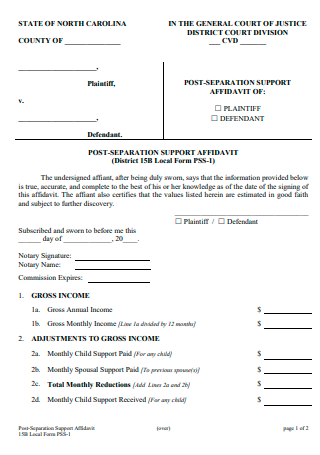
Support Affidavit of Post Separation
download now -
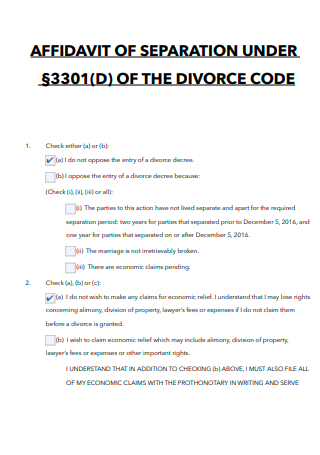
Affidavit of Separation of Divorce Code
download now -
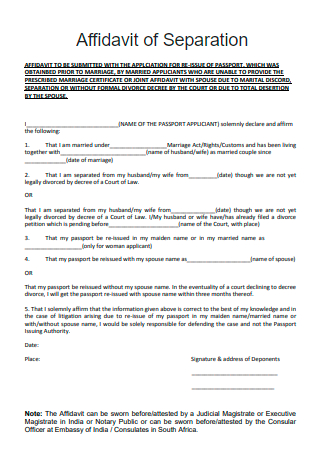
Affidavit of Separation in PDF
download now -
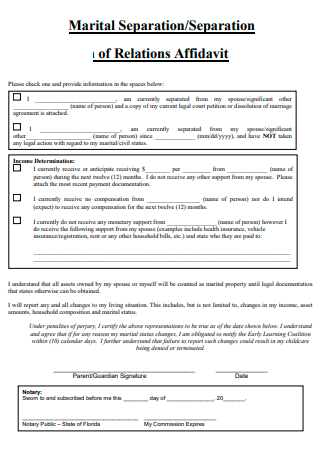
Affidavit of Relations Separation
download now -
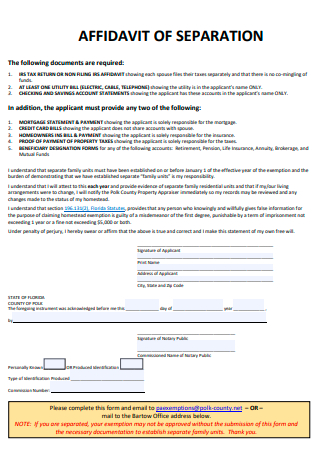
Basic Affidavit of Separation
download now -
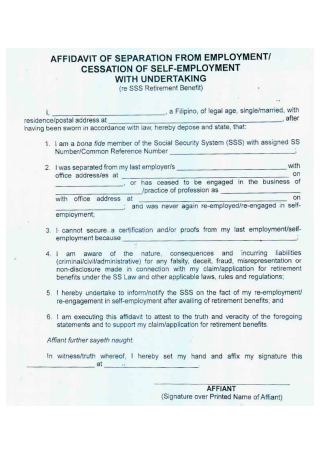
Affidavit of Separation From Employment
download now -
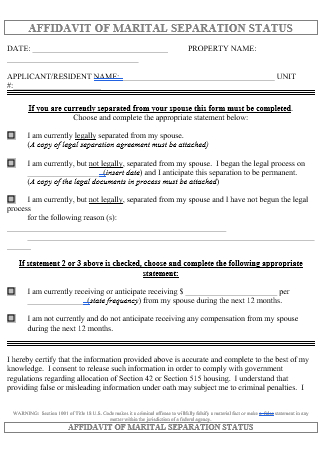
Affidavit of Martial Separation Status
download now
FREE Affidavit of Separation s to Download
11+ SAMPLE Affidavit of Separation
What Is an Affidavit of Separation?
What Are the Effects of Legal Separation?
What Are the Different Types of Separation?
Steps to Follow for Legal Separation:
FAQs
Does Long Separation Automatically Nullify Marriage?
What Is the Difference Between Legal Separation and Divorce?
Can I File As Single If I Am Legally Separated?
Is It Better to Divorce or Separate?
What Is an Affidavit of Separation?
An affidavit of separation is a legal document that proves that you and your spouse have separated. The affidavit details the individual information of the couple or parties, a statement that states that there is no possibility of reconciliation, and custody information such as, which parent gets full custody and which parent is required to provide child support. Once the affidavit has been final and irrevocable, it must be signed and notarized at the notary public. An affidavit of separation is best completed with a template that you can simply find in this article.
What Are the Effects of Legal Separation?
Below are the legal consequences of legal separation:
Separation
The spouses shall be entitled to live separately from each other, but the marriage bonds shall not be severed.
Property Relations
The absolute community of property (ACP) or the conjugal partnership of gains (CPG), as the case may be, shall be dissolved and liquidated. The court, in the absence of a written agreement between the spouses, shall designate either of them or a third person to administer the absolute community or conjugal partnership property. The administrator appointed by the court shall have the same powers and duties as those of a guardian.
Custody of Children
The custody of the minor children shall be awarded to the innocent spouse, but no child under 7 years shall be separated from the mother unless there are compelling reasons. During the pendency of the action, the custody of children will be governed either by written agreement, or by court order, based on the best interest of the child. The court will apply the following order of preference, both parents jointly: (a) either parent (may consider the choice of child over 7 years) unless such parent is considered unfit, (b) surviving grandparent (if several, then choice of child over 7 years, unless grandparent chosen is unfit/disqualified), (c) eldest brother/sister over 21 unless unfit/disqualified, or (d) any other person deemed suitable by the court.
Support
During the pendency of the action, child and spousal support will be governed by either written agreement, or in the absence thereof, from the ACP/CPG. After decree, either parent or both may be ordered by the court to given an amount necessary for support in proportion to resources/means of giver and necessities of the recipient. Spousal support is considered as an advance to be deducted from the share of the spouse supported during liquidation. There may be restitution of spousal support if after decree, the court finds that the person providing support pendente lite is not liable therefor. Please note that a judgment granting support never becomes final. It may be adjusted or modified according to circumstances and the spouse’s financial capability.
Succession
The offending spouse shall be disqualified from inheriting from the innocent spouse by intestate succession. Moreover, provisions in favor of the offending spouse made in the will of the innocent spouse shall be revoked by operation of law.
What Are the Different Types of Separation?
When it comes to marriage, separation is not the same as divorce—even if you have a “judgment of separation” from a court. Separation means that you are living apart from your spouse but are still legally married until you get a judgment of divorce. Although a separation does not end your marriage, it does affect the financial responsibilities between you and your spouse before the divorce is final. There are three types of separation:
Steps to Follow for Legal Separation:
Below is a general outline of the steps in an action for legal separation. Please note that in some instances, these steps may not be followed:
Step 1: Preparation of the Petition
The petition shall allege the complete facts constituting the cause of action. It shall state the names and ages of the common children of the parties and specify the regime governing their property relations, as well as the properties involved. If there is no adequate provision in a written agreement between the parties, the petitioner may apply for a provisional order for spousal support, custody and support of common children, visitation rights, administration of community or conjugal property, and other matters similarly requiring urgent action.
Step 2: Filing of Petition
The petition is filed with the Regional Trial Court. Cases involving marriage and family matters will be raffled only to designated Family Courts. This will take about a week. After the raffle, the petition will be forwarded to the selected court. After the filing of the petition for legal separation, the spouses shall be entitled to live separately from each other.
Step 3: Summons
The court will issue summons one or two weeks after the case is raffled. Where the respondent cannot be located at his given address or his whereabouts are unknown and cannot be ascertained by diligent inquiry, service of summons may, with the permission of the court, be affected upon him by publication once a week for two consecutive weeks in a newspaper of general circulation and in such places as the court may order.
Step 4: Answer
The respondent shall file his answer within 15 days from service of summons, or within 30 days from the last issue of publication in case of service of summons by publication.
Step 5: Cooling-Off Period
An action for legal separation shall in no case be tried before 6 months shall have elapsed since the filing of the petition.
Step 6: Mediation/Reconciliation
No legal separation may be decreed unless the court has taken steps toward the reconciliation of the spouses and is fully satisfied, despite such efforts, that reconciliation is highly improbable.
Step 7: Collusion Hearing
In any case, the court shall order the prosecuting attorney assigned to the case to take steps to prevent collusion between the parties and to take care that the evidence is not fabricated or suppressed. If the public prosecutor finds that collusion exists, he shall state the basis thereof in his report. The parties shall file their respective comments on the finding of collusion within 10 days from receipt of a copy of the report. The court shall set the report for hearing and if convinced that the parties are in collusion, it shall dismiss the petition.
Step 8: Preliminary Hearing or Pre-Trial Order
The court will hold a preliminary hearing, which requires both parties to attend. A pre-trial order will be issued. Normally, the preliminary hearing is called about two to four months after the filing of the petition.
Step 9: Decision
The Court will then issue an order that the case is submitted for resolution. The decision may be released 30-90 days after the said order is issued.
Step 10: Decree of Legal Separation
The court shall issue the decree of legal separation after: (a) registration of the entry of judgment granting the petition for legal separation in the Civil Registry where the marriage was celebrated and in the Civil Registry where the Family Court is located; and (b) registration of the approved partition and distribution of the properties of the spouses, in the proper Register of Deeds where the real properties are located. The court shall quote in the Decree the dispositive portion of the judgment entered and attach to the Decree the approved deed of partition.
An action for legal separation may be finished from 10 months or several years depending on various factors like the complexity of the case (e.g. properties and custody, support, etc. are heavily contested), availability of the court, witnesses and documentary evidence, and also the place where the petition will be filed.
FAQs
Does Long Separation Automatically Nullify Marriage?
Even if you are separated from your spouse for 10 years, it is not a sufficient ground for annulment. It is one of the most common topics being discussed in legal forums. If one has already found a new person to love, long separation does not necessarily nullify marriage because laws still get in the way.
What Is the Difference Between Legal Separation and Divorce?
The main difference in law between divorce and judicial separation is that a divorce allows both parties to remarry whereas a judicial separation does not. However, the court may review arrangements made in a decree of judicial separation in any application for a decree of divorce.
Can I File As Single If I Am Legally Separated?
If tax law considers you “unmarried” because you got a decree of separation maintenance prior to December 31, you can file with “single” or “head of household” status. “Head of household” requires you to have a dependent and pay at least half of the expenses needed to maintain a home.
Is It Better to Divorce or Separate?
By taking some time apart from your spouse before you file for divorce, you can make sure that divorce is the right option for you and feel confident moving forward in the divorce process. Separation can allow both spouses to reconnect with hobbies or other aspects of life they felt were missing during their marriage.
Many married couples share benefits such as filing joint taxes, Social Security payments or health insurance coverage provided by one spouse’s employer under a family plan. When couples divorce, they are likely to lose access to the financial benefits of marriage. Separations allow both parties in the marriage to continue to receive these benefits without filing for divorce. Living apart from each other and remaining married allows some spouses to maintain a good quality of life while also effectively ending their obligations to the marital relationship they have.
